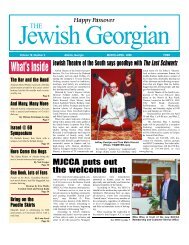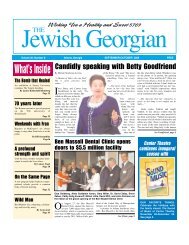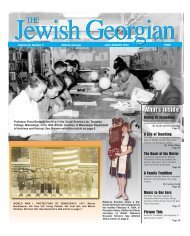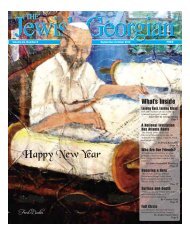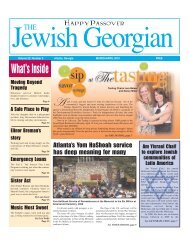Create successful ePaper yourself
Turn your PDF publications into a flip-book with our unique Google optimized e-Paper software.
November-December 2010 THE JEWISH GEORGIAN Page 33<br />
Downsizing? Moving? Settling an estate? Here’s help<br />
Customers have been known to camp<br />
outdoors overnight waiting for the doors to<br />
open on her estate sales. “This is true,”<br />
Shirley Romm Wender, manager of the<br />
longest continuous estate sales business in<br />
Atlanta, modestly verifies.<br />
In 1969, she and Frances Kuniansky<br />
started their estate and moving sales. Now<br />
the business has a more formal title: Home<br />
Furnishings Brokerage. Frances bowed out<br />
in 1996, and Shirley was joined in her<br />
endeavor by Litchfield Carpenter in 1999.<br />
Carpenter was the curator of the house<br />
collection (circa 1790 to 1830) of the<br />
Travelers Rest Plantation & Museum in<br />
Nashville. He is also experienced in doing<br />
appraisals. He says he especially enjoys the<br />
research on history of the family connections<br />
that they find in the estates of prominent<br />
Atlantans. <strong>The</strong>se collections often contain<br />
antique books, pictures, crystal, porcelains,<br />
and family silver, as well as furniture.<br />
<strong>The</strong> schedule goes like this: <strong>The</strong> weekend<br />
date is advertised in the newspaper’s<br />
seasonal value sales section and loyal customers<br />
are notified via e-mail. <strong>The</strong> Monday<br />
before the sale, Shirley and Litch price<br />
Dining room on sale day displaying<br />
furniture, china, silver and crystal<br />
Carolyn<br />
Gold<br />
everything with tags. <strong>The</strong>y may need to<br />
bring in help for moving big furniture<br />
pieces and for setting up tables and sometimes<br />
clothes racks for special designer<br />
items.<br />
Sale days are Saturday and Sunday,<br />
10:00 a.m.-4:00 p.m. Prices are firm the<br />
first day, but buyers can leave offers for<br />
items that are not sold. Shirley’s daughter,<br />
Sally Berry, often helps with sales. <strong>The</strong><br />
company averages about one sale a month<br />
or at least 10 a year. Customers include collectors,<br />
dealers, young couples seeking<br />
their first furnishings, and grandparents<br />
helping offspring furnish.<br />
Silver teapot with warmer<br />
When asked about some memorable<br />
items, Litch recalled a beautiful 1810 silk<br />
needlework picture of a memorial to<br />
George Washington. <strong>The</strong>n the two mentioned<br />
the Princess Diana crystal they sold.<br />
You are what you eat<br />
By Susan Robinson<br />
<strong>The</strong> Publix cashier stopped ringing up<br />
my groceries to ask me a question about<br />
one of my items. “Have you ever eaten this<br />
before?” No, I had actually never tried such<br />
a fruit in my life. It was yellow, oblong and<br />
had spikes, hence it’s name, “horned<br />
melon.”<br />
“So, you’re buying it just to try it?” she<br />
asked. It was an understandable question.<br />
<strong>The</strong> item had rung up at $5.98, a very hefty<br />
sum for one lone fruit, let alone one I didn’t<br />
know if I would enjoy. But Yom Tov was<br />
right around the corner. I needed a new fruit<br />
so that I could say the bracha,<br />
Shehecheyanu, the blessing said upon<br />
reaching a special occasion. I had purchased<br />
a star fruit as well.<br />
<strong>The</strong> cashier, her hair in an elegant<br />
head-wrap, then held up my star fruit. In her<br />
lilting Caribbean accent she said, “In my<br />
country, we call this Five Fingers.” A few<br />
seconds later, she scanned my package of<br />
egg kichels, crispy bowtie cookies.<br />
BY<br />
“Mmmm,” she wondered aloud, “are<br />
these hard or soft?” She held the package<br />
closer for inspection.<br />
“Hard,” I told her. “You eat them with<br />
coffee.”<br />
——-<br />
Food is fun. Food is also serious, representing<br />
our cultures, backgrounds, and<br />
histories. Many years ago, I was completing<br />
a practicum in a small preschool in downtown<br />
Atlanta. A major negotiating point to<br />
my teaching there was the food issue. <strong>The</strong><br />
director pointed out that everyone must eat<br />
lunch together: the same food, at the same<br />
table, at the same time. This, she said, was<br />
so that the teachers could model appropriate<br />
dining etiquette. I countered with my, “I<br />
only eat kosher food” argument. I would<br />
not be able to eat the center’s lunch.<br />
“Multiculturalism” was the newest<br />
buzzword at the time, and so the director<br />
agreed to make an exception in my case. All<br />
the teachers, staff, and children ate food<br />
Needlework picture<br />
<strong>The</strong>ir funniest story was of the lady<br />
who spent thousands on a set of Royal<br />
Crown Derby porcelain with hand-painted<br />
pictures of palaces and royal estates, then<br />
wheeled them home in a grocery cart. <strong>The</strong>y<br />
also found among other treasures a photograph<br />
of the surrender of the Japanese after<br />
World War II, autographed to Admiral<br />
Nimitz.<br />
One of Shirley and Litch’s biggest<br />
events was the October 23-24 sale of items<br />
from the downtown Commerce Club. Many<br />
of the pieces were Atlanta history-related:<br />
paintings, china, Waterford chandeliers, old<br />
silver, Regency furniture, sideboards, and<br />
serving carts.<br />
Over the years, their sales have included<br />
pianos, antique secretaries, stained glass<br />
windows, cars, Oriental rugs, Steuben<br />
glass, oil paintings, and a collection of contemporary<br />
art. Shirley is still enthusiastic<br />
about the work. She even jokes about a<br />
recent call from someone who wanted them<br />
to sell a tool collection.<br />
Perhaps that is not as elegant as some<br />
of the beautiful homes she has cleared, but<br />
there’s always the excitement regarding<br />
from the communal kitchen; I ate with the<br />
group, but brought my own sandwiches and<br />
yogurt.<br />
I had, in essence, officially outed<br />
myself as an observant Jew.<br />
Weeks later, during the children’s naptime,<br />
we got to talking. <strong>The</strong> lights were off.<br />
Soft lullaby music played in the background.<br />
Some children slept, others quietly<br />
“read” books while resting on their mats.<br />
We, the adults, were drinking coffee, finishing<br />
up the last of our lunch, and quietly<br />
sharing little bits of casual conversation.<br />
<strong>The</strong> lead teacher was an African-American<br />
male. <strong>The</strong> co-teacher’s family was from the<br />
Philippines. <strong>The</strong> conversation covered politics<br />
and personal finances—two major nono’s<br />
in polite company. Somehow, after<br />
spending all that time together, everyone<br />
felt comfortable with the discussion.<br />
Eventually, we got around to religion.<br />
“So, Susan, tell us about your traditions,”<br />
the other teachers asked me after<br />
sharing their respective beliefs and customs.<br />
Well, where would you begin? First,<br />
there’s Shabbat, then the holidays, then<br />
Kashrut. What about shul? Day schools?<br />
Shirley Romm Wender prices an<br />
item for the Commerce Club sale.<br />
Litchfield Carpenter shows<br />
Commerce Clubʼs beautiful antique<br />
chest.<br />
what will happen next. <strong>The</strong>re’s the breakfront<br />
that sold for $20,000 and the $50,000<br />
Oriental rug that didn’t sell. <strong>The</strong>se treasures<br />
and many more are why customers wait for<br />
hours on sale days to see what they’ll find<br />
this time.<br />
What about life cycle events—brit milah,<br />
bar/bat mitzvah, weddings? What, exactly,<br />
is a mikvah? And an eruv? And why on<br />
earth would I ever feel compelled to buy a<br />
new fruit? What exactly is the basis for all<br />
of this? With only seven more minutes left<br />
to naptime, I kept my talk to my food situation.<br />
It was, after all, a simple beginning.<br />
And here I am, thinking about food yet<br />
again. With Chanukah just around the corner,<br />
my thoughts are drifting towards potato<br />
latkes and sufganiot, Chanukah doughnuts.<br />
Neither one would ever make the list<br />
of healthy foods, yet somehow both are<br />
necessary. We could talk about the relationship<br />
of the Maccabees to the Chanukah<br />
olive oil. We could also talk about the significance<br />
of the oil in both the latkes and<br />
the sufganiot. But there’s something else<br />
going on here as well. Eating foods that we<br />
share in common is a social, bonding activity.<br />
It’s part of our shared history. <strong>The</strong> next<br />
time someone asks about my traditions, I<br />
may just begin with the “shared history”<br />
part, and add the food component later.<br />
Either way, it’s a simple beginning to a<br />
grand story.<br />
Happy Chanukah, Y’all!



